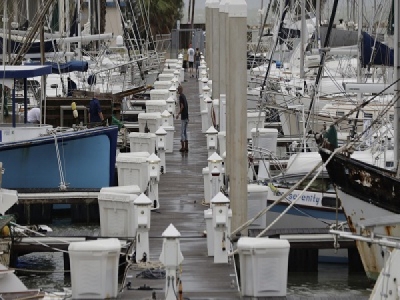
Posted on August 29, 2017
By Erica E. Phillips and Brian Baskin, The Wall Street Journal
Seaports along the Texas coast shut down Friday as they prepared for heavy rains and winds from Hurricane Harvey, disrupting shipments of energy products and consumer goods along one of the nation’s busiest shipping corridors. (Follow live coverage of the storm.)
By midday, terminals at Port Houston, a major shipping hub for petroleum products and container cargo, were no longer accepting arriving vessels or any deliveries by truck. Port facilities in Galveston, Corpus Christi, and elsewhere along the coast were also closed, and dockworkers were working to ensure loose cargo and equipment were secure.
In Houston, fewer than a dozen ships, including crude tankers, general cargo ships and at least one small container ship, remained in port Friday morning. The local pilots association—whose members navigate ships up and down the Houston ship channel—said those ships were expected to stay, but that most if not all the ships waiting offshore at anchor had departed.
“Everybody’s moving away from the areas predicted to be impacted by the storm,” said J.J. Plunkett, chief operating officer of the Houston Pilots Association, which called in extra pilots to clear outgoing ships on Thursday.
While the pilots often deal with strong summer storms and related delays, Mr. Plunkett said Hurricane Harvey would be different.
“Normally if we have a summer storm and conditions get terrible, we usually know it’ll pass in 12 hours,” he said. “For this one, the path of Harvey once it leaves is uncertain. We aren’t sure when conditions will improve or when we’ll reopen…we’re hunkered down.”
The stretch of coastline from Corpus Christi up to southwestern Louisiana is normally crowded with tankers bringing oil, gasoline and other products into and out of the area’s ports, as well as container ships bearing products ranging from auto parts to furniture and toys.
Container cargo ships expected at Texas ports may simply slow down to wait out the storm or be rerouted to alternative ports of entry in Louisiana, Florida or Georgia, said Foster Finley, a managing director at consultancy AlixPartners. But delays in oil and fuel shipments can quickly drive up prices because so much of the nation’s refinery capacity is clustered in the region.
The Houston port was expecting arrivals of large cargo vessels over the coming days operated by ocean shipping companies, including A.P. Moeller-Maersk A/S, CMA CGM and Mediterranean Shipping Co.
A spokesman for Moeller-Maersk’s MaerskLine, the world’s biggest container ship operator, said the company didn’t have plans to reroute any ships or cargo away from Houston, but there could be delays. Deliveries from one ship, the Maersk Ohio, were already expected to be postponed 24 hours, according to an advisory the company sent to customers. Ultimately, cargo delays will depend on the extent of the flooding, any damage the ports and surround roads and railways may sustain, and whether a backlog of ships builds up in the wake of the storm, a Maersk spokesman said.
BNSF Railway also sent a notice to customers, saying that trains destined for Galveston would be held at other locations until further notice. Railcars were being moved away from the lowest-lying areas, according to the notice, and rail crews were on alert for any needed track repairs.
The Texas coastline hasn’t experienced a hurricane since Ike in 2008. Since then, Houston has become an increasingly important destination for seaborne imports ranging from auto parts to furniture and toys.
The city’s port is an early stop for ships passing through the Panama Canal, which was widened last summer to allow bigger vessels to pass through. Many retailers and manufacturers now bring in goods from Asia through Houston instead of the West Coast, with Chinese container imports surging 35% in July compared with a year earlier, according to trade data service Panjiva.
Houston’s new role in the global supply chain means any extended delays would ripple up and down the East Coast and could be felt as far away as Europe, said Chris Rogers, a Panjiva analyst.
Large container ships typically make multiple stops, so a two-day delay in dropping off cargo in Houston would then postpone shipments destined for Savannah, Ga., New York and even the Dutch port of Rotterdam.
“An extended outage, even if it’s only a handful of days, can have a knock-on effect in shipping not just in Texas but around the Atlantic Basin,” Mr. Rogers said.
With ports closed, Jetco Delivery, which operates a fleet of 125 trucks mainly working at Houston’s port and in the energy industry, is instead delivering food, drums of fuel and other emergency supplies, said Brian Fielkow, Jetco’s chief executive.
He said some of the biggest challenges will likely come after the storm passes. Ports will need to deal with the backlog of ships waiting offshore to deliver their cargo, even as some roads commonly used by trucks will still be under water.
“Everything’s always a mess at startup” after a storm, Mr. Fielkow said.
Source: The Wall Street Journal





